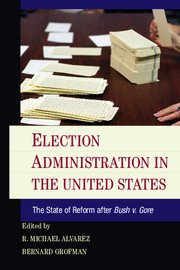Book contents
- Frontmatter
- Contents
- List of Contributors
- Foreword
- Acknowledgments
- Editors’ Introduction
- Part I Bush v. Gore in Perspective
- Part II What Has Changed since Bush v. Gore?
- Part III Remaining Challenges
- 8 The Evolution (or Not) of Ballot Design Ten Years after Bush v. Gore
- 9 Poll Workers and Polling Places
- 10 Resolving Voter Registration Problems
- 11 Felon Disenfranchisement after Bush v. Gore
- Epilogue
- References
- Index
Epilogue
Bush v. Gore and the Constitutional Right to Vote
Published online by Cambridge University Press: 05 October 2014
- Frontmatter
- Contents
- List of Contributors
- Foreword
- Acknowledgments
- Editors’ Introduction
- Part I Bush v. Gore in Perspective
- Part II What Has Changed since Bush v. Gore?
- Part III Remaining Challenges
- 8 The Evolution (or Not) of Ballot Design Ten Years after Bush v. Gore
- 9 Poll Workers and Polling Places
- 10 Resolving Voter Registration Problems
- 11 Felon Disenfranchisement after Bush v. Gore
- Epilogue
- References
- Index
Summary
The purely partisan perspective on Bush v. Gore focuses on the ongoing, contested dimensions of a close election and the controversial role of the Supreme Court in declaring game over. On this telling, the Bush v. Gore decision was a denial of the right of every vote to be counted amid an institutional power grab for the Republican Party. From this point of view, the main legacy of that dramatic moment in constitutional and political history is that everything possible should be done to allow postelection validation of all votes, including the expanding role for provisional ballots. The reform upshot was the Help America Vote Act (HAVA), a complicated legislative gambit that tried to rationalize state voter registration records at the state level, created a generally useless Electoral Assistance Commission, and enshrined a system of postelection challenges to provisional ballots that, while perhaps better than the other available options, is also a litigation nightmare just waiting to happen.
Perhaps the passage of time will allow an alternative story, one in which the postelection partisan scramble was even more important as a window into the much more pervasive and structural dysfunctionalities of the American electoral system. This alternative account begins at the top with a winner-take-all Electoral College system that created the cliff effect necessary for Florida 2000 – the ability of a few hundred actual votes to determine whether Florida’s twenty-five Electoral College votes would be entirely captured by George Bush or Al Gore. From there, the story of electoral dysfunction would cast attention on how control of federal elections is still, more than 200 years since the Constitution’s creation, overwhelmingly left in the hands of the states and, ultimately, in those of local county administrators. Voting lists are kept in local polling books; volunteers (mostly female and mostly senior, even on a more probing reexamination) staff election administration generally with inadequate training and little more than episodic engagement with complicated election rules. This account would add in the local administrators who purchase voting machines from friendly vendors and devise ballots based on whimsical expectations of voter capabilities. And the list would run to partisan control of the machinery of elections.
- Type
- Chapter
- Information
- Election Administration in the United StatesThe State of Reform after Bush v. Gore, pp. 212 - 222Publisher: Cambridge University PressPrint publication year: 2014
- 1
- Cited by



